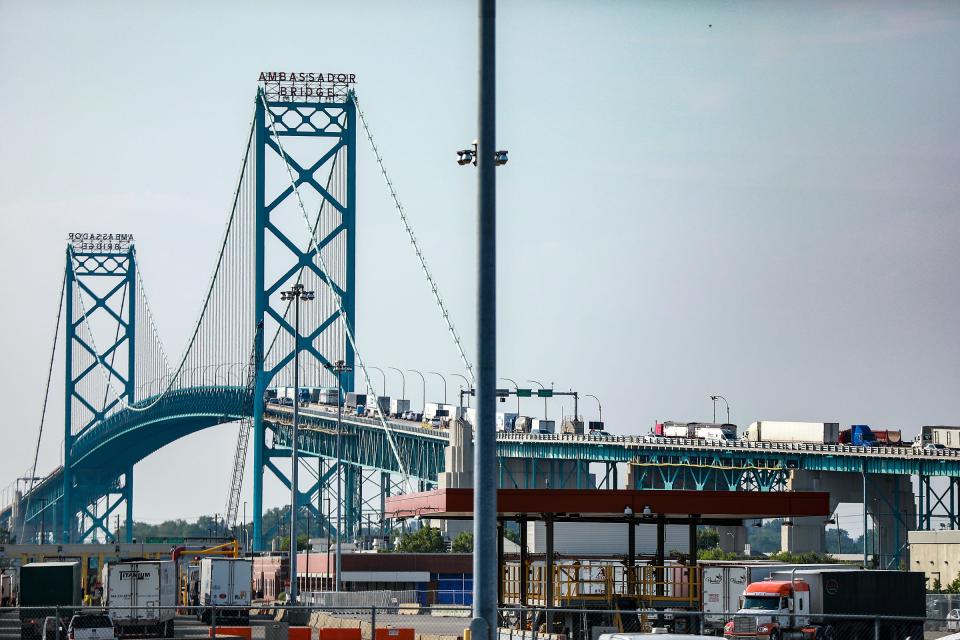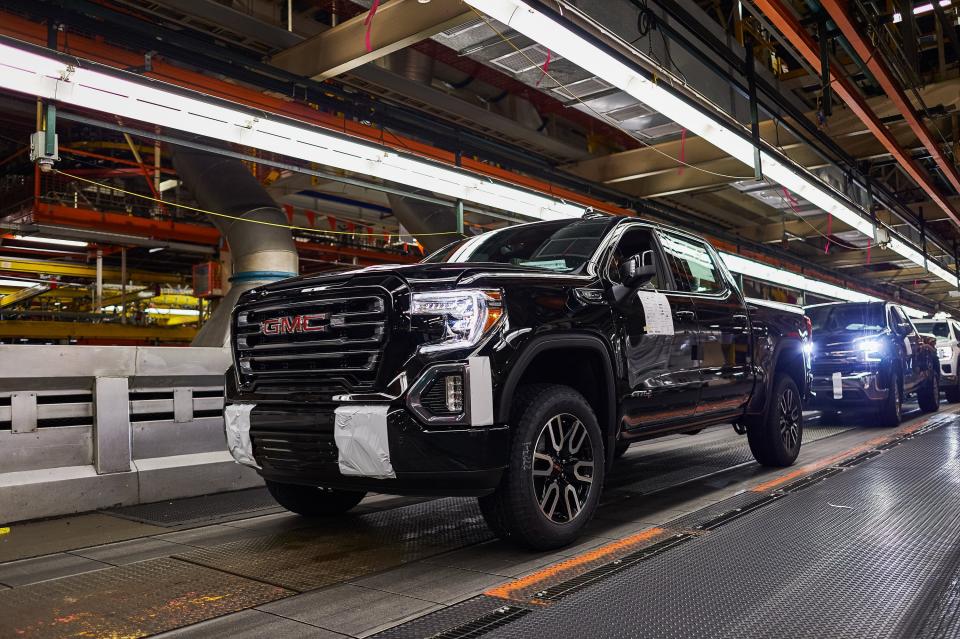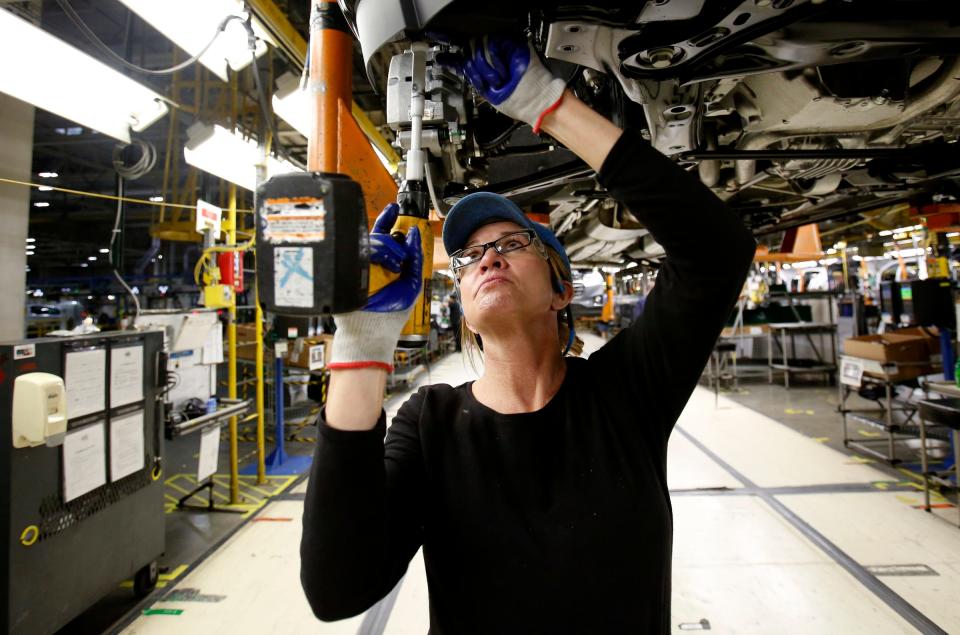Automakers work to bypass trucker protest at Ambassador Bridge as plants cancel shifts
Detroit Three automakers are working to get auto parts over the U.S.-Canada border any way they can.
In the case of General Motors, it is chartering cargo planes to fly parts stuck at Canada's border over the Detroit River and into the U.S. to keep a critical truck plant going.
The parts shortage is due to a protest by truck drivers at the Ambassador Bridge. The drivers oppose a vaccine mandate to enter Canada, among other things. It is the fourth day of the protest blockade, which is now shutting down all traffic on the bridge and backing it up on Michigan's other border crossing, the Blue Water Bridge in Port Huron.

The Ambassador Bridge is a major international gateway where about $356 million in goods travel between Detroit and Windsor every day, according to Politico.
It is also a key link for the automotive industry to ship parts to factories.
Production disruption
GM and Ford Motor Co. confirmed the bridge blockade has disrupted production of new vehicles and engines at some of their plants Wednesday and Thursday.
About 1 p.m. Thursday, GM notified employees of its Lansing Delta Township Assembly plant that it was canceling second shift due to a parts shortage caused by the bridge protest. In a notice obtained by the Free Press, GM said its first shift at the plant would resume Friday.
GM makes its midsize SUVs at Lansing Delta Township. GM canceled the second shift Wednesday and the first shift Thursday at the factory due to the bridge protest preventing parts from getting to the plant.
Ford's plant in Oakville, Ontario and its Windsor engine plant are working at “reduced capacity” due to bridge situation, Ford spokeswoman Kelli Felker said Thursday morning. Ford makes its Ford Edge and Lincoln Nautilus SUVs at the Oakville plant and engines at Windsor. Ford makes two engines at its Windsor plant: One goes into the F-150 pickup and Mustang muscle car. The other goes into Super Duty pickup and Econoline van, Felker said.
“No other impacts at this time," Felker said. But on Wednesday, Oakville was working at reduced capacity and Windsor Engine was closed because of the bridge protest.
But the Windsor Star reported Ford was flying in parts to Windsor. Ford declined to confirm whether parts were being flown into its Windsor site on Thursday.
“We’re looking at all options to keep our plants running,” Felker said.
Stellantis said all of its plants were running Thursday morning, but it had to cut second shifts at some plants Wednesday night.
On Thursday, Stellantis had to cut the first shift off early at Windsor Assembly plant, where it builds the Chrysler Pacifica minivan, due to the parts shortage. Windsor Assembly Plant has been one of the Stellantis plants that has been most affected by the ongoing chip shortage as well. It faced considerable downtime over the past year as the automaker prioritized production of its most profitable trucks and SUVs.
Toledo also cut short its first shift Thursday. Toledo is where the Jeep Wrangler and Gladiator are built.
"We continue to work closely with our carriers to get parts into the plants to mitigate further disruptions," said Stellantis spokeswoman Jodi Tinson. "The situation at the Ambassador Bridge, combined with an already fragile supply chain, will bring further hardship to people and industries still struggling to recover from the COVID-19 pandemic."
Tinson said the company is hoping that a resolution between the protesting truck drivers and the government of Canada can be reached soon, "so our plants and our employees can return to normal operations."
At Toyota, two plants are impacted by the blockade: Toyota Motor Manufacturing Canada and Toyota Motor Manufacturing Kentucky, spokeswoman Kelly Stefanich said.
"Due to a number of supply chain, severe weather and COVID-related challenges, Toyota continues to face shortages affecting production at our North American plants," Stefanich said in a statement. "Our teams are closely monitoring the situation and working diligently to minimize the impact on production."
But she said Toyota expects disruptions through the weekend, and it will continue to make adjustments as needed.
"While the situation is fluid and changes frequently, we do not anticipate any impact to employment at this time," Stefanich said.
But leaders of industry associations warn the situation, "may spread the longer the disruptions persist."
“U.S. automakers and suppliers are doing everything possible to maximize production with what they have, working to keep lines running and shifts scheduled to minimize the impact on American autoworkers," former Missouri Gov. Matt Blunt, president of the American Automotive Policy Council; Bill Long, president of the Motor and Equipment Manufacturers Association, and Julie Fream, president of the Original Equipment Suppliers Association, said in a joint statement:
GM turns to the skies
Early Thursday morning, UAW Local 2209 Shop Chairman Rich LeTourneau rushed to a meeting with the plant manager for Fort Wayne Assembly in Indiana, where GM builds its popular and profitable Chevrolet Silverado and GMC Sierra full-size light duty pickups.
The urgent meeting was to discuss a shortage of bumper brackets and taillights that cross the Ambassador Bridge headed to Fort Wayne regularly as part of a "just-in-time" manufacturing process most automakers use, LeTourneau said.

"Just-in-time" means the plant does not keep a large inventory of parts, but rather schedules it so the parts are delivered just as they are needed on the assembly line.
In this case, the parts needed at Fort Wayne are "sitting on the border" with no way to be driven across the bridge that is now blocked by the protest, LeTourneau said.
"We're gonna have them flown in," LeTourneau told the Free Press on Thursday morning. He did not know further details. "The parts won't get here until 12:30 or 1 this afternoon. So we'll be down a little while before they land with the parts."
LeTourneau expects the plant will idle for about an hour, losing production of about 70 new trucks, but better than having to cancel a whole shift or shut down the plant.
GM spokesman Dan Flores declined to speculate on further potential impact from the bridge blockade, saying GM will continue to work with suppliers to mitigate the situation.
"We're not going disclose or confirm the specifics of what we're doing, but we have and will continue to explore all the options available to keep our regular production schedules intact," Flores said.
For example, he said, "during challenging circumstances, GM does explore the option of using charter flights to get parts to plants, but because of competitive reasons GM will not confirm or offer details of using cargo planes at this time."
Last year, when severe weather crippled trucks delivering parts from Texas to Fort Wayne, GM had them flown in, LeTourneau said.
Flores added, "This is certainly a fluid situation and we have and will continue to mitigate the issues with our supply base as potential shortages surface."
More: GM stops production at highly profitable pickup plant in Fort Wayne, 3 others
The cost of closure
The Ambassador Bridge blockade is costing Michigan's auto industry big bucks.
East Lansing-based Anderson Economic Group estimates that the "Freedom Convoy" protests in Canada have cost more than $51 million in direct lost auto-industry wages in Michigan for the first week, beginning Monday, according to a news release, which noted that the figure does not take into account potential losses in other industries beyond automotive.
"AEG’s estimate is for a single week of disruption for full-time employees on site and involved in transit in the U.S. and Canada. We considered automakers including GM, Ford, and Chrysler in Michigan and Ontario, as well as those for Toyota and Honda. We include Tier 1 and Tier 2 suppliers, as well as transit and logistics workers," the release said.
At GM, the automaker had managed to keep Flint Assembly going without any interruption even through noon Thursday, confirmed UAW Local 598 Shop Chairman Eric Welter of the plant, where GM builds its popular and profitable heavy-duty version pickups. .
But, later Thursday afternoon, officials confirmed that Flint Assembly's first shift was cut short due to a shortage of parts. GM had been rerouting trucks with parts around the blocked bridge into Michigan to the plant in an effort to stave off a shift disruption.
But Lansing Delta Township Assembly has not fared as well. GM had to cancel its second shift there Wednesday and then the first shift Thursday due to a parts shortage caused by the bridge blockage.

Canceling those two shifts at Lansing Delta Township Assembly could cost GM about $1.2 million in potential profits daily, experts say.
That estimate is calculated based on data in GM's financial filing for its 2021 results. The calculation indicates that GM's average earnings before interest and taxes for each Buick Enclave and Chevy Traverse midsize SUV built at Lansing Delta Township Assembly was at least $2,000, said David Whiston, auto analyst at Morningstar.
The latest figure for how many Enclave and Traverse SUVs GM builds at the plant comes from a GM tweet in 2019 that said: "Our mighty Lansing Delta Township Assembly team has built more than 2.8 million crossover vehicles. That’s approximately 590 vehicles a day on average since its opening in 2006."
#DYK: Our mighty Lansing Delta Township Assembly team has built more than 2.8 million crossover vehicles. That’s approximately 590 vehicles a day on average since its opening in 2006. #USManufacturing pic.twitter.com/DinBSdXK3a
— General Motors (@GM) April 8, 2019
Using the 590 figure, it amounts to an estimated daily loss of $1.2 million.
"The analysis holds water," said Joseph McCabe, CEO of AutoForecast Solutions. "However, if the net effect is the loss of a thousand units or so, being that it is early February, GM would have plenty of time over the course of the year to rebalance future shifts to recoup production and therefore lost short-term profits. If they believe the sales of these vehicles warrants the need to do so."
Flores declined to comment on the financial impact of the shift cancellations.
More: GM cancels shifts at one car plant, works to keep another going amid bridge protest
More: GM's chip strategy that keeps production running as Ford goes down
Free Press staff writers Eric D. Lawrence and Phoebe Wall Howard contributed to this report.
Contact Jamie L. LaReau: 313-222-2149 or jlareau@freepress.com. Follow her on Twitter @jlareauan. Read more on General Motors and sign up for our autos newsletter. Become a subscriber.
This article originally appeared on Detroit Free Press: Automakers bypass Canada trucker protest as plants cancel shifts

